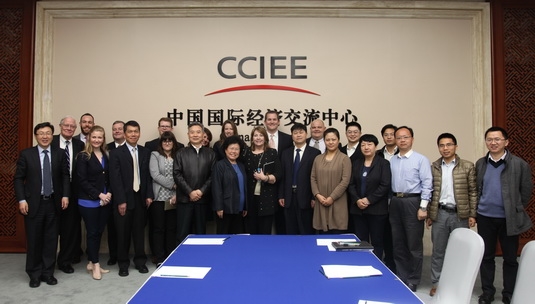Chen Wenling Meets with US Delegation of Assistants to Congressmen
- Time:2015-05-04
- source:CCIEE
Chen Wenling Meets with US Delegation of Assistants to Congressmen
On April 2, 2015, Ms. Chen Wenling, Chief Economist of CCIEE, met with the US delegation of Assistants to Congressmen. Ms. Tian Qing, Director General of the Strategic Department, Xu Hongcai, Director General of Economic Research Department and Xu Caoyou, Director General of the Department of External Affairs of CCIEE, also attended the meeting.

The delegation is consisted of the Chiefs of Staff of the military committee, foreign affairs committee and financial committee in both houses of congress and organized by Asia Society.
Ms. Chen Wenling gave an in-depth analysis of the New Normal and new driving force of China’s economy. She noted that China’s economic growth rate decreased from the previous 10% to 7%-8% is not only the basic feature of the New Normal, but also the law of economic development.
Last year, China’s economic contribution accounted for one third of the total world’s economic growth and the absolute growth is much higher than before. Right now, the most important task for China is to change the driving force of China’s economy. Innovation-driven growth has become China’s national strategy and China will soon launch the “2015 Made in China” Strategy to advance restructuring in manufacturing.
Boosted domestic consumption, market dividend, urbanization and new population dividend have provided China’s with new impetus for economic growth. The Internet Plus Plan, proposed by Chinese government for the first time has made internet one of its national strategies and this is likely to bring ample opportunities for the internet industry.
Furthermore, China’s continuous opening-up and reform will create huge momentum for its economic growth. For example, China will accelerate the promotion of Pilot Free Trade Zone, continue to advance negotiations on bilateral investment with the US, Europe and other countries, and realize the five connectivity with countries involved in the One Belt & One Road strategy, and put more emphasize on government decentralization.
At the end of the meeting, the two sides exchanged their views on Asian Infrastructure Investment Bank and the One Belt & One Road strategy.
